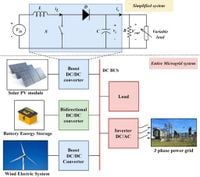In a world grappling with sustainable energy demands, microgrids are emerging as a pivotal solution, efficiently integrating various distributed energy resources to bolster energy reliability and sustainability. Recent research highlights the role of cascaded fractional-order controllers (C-FOC) in optimizing performance within these microgrid systems, especially under fluctuating conditions.
Published on March 25, 2025, by a team of researchers at the Microgrid Lab of Amrita School of Engineering in Bengaluru, the study painstakingly compares four distinct topologies of cascaded fractional order proportional integral (C-FOPI) controllers with traditional cascaded proportional integral controllers. The research particularly employs the Elephant Herd Optimization (EHO) algorithm to enhance control accuracy and responsiveness.
The results from simulations demonstrate that the FO(PI)-FOPI controller outperforms traditional PI-PI controllers significantly. Specifically, it achieves a staggering 36.5% reduction in settling time, while also enhancing steady-state accuracy by up to 50%. This optimization is critical, especially in environments characterized by rapid changes in solar irradiation levels and fluctuating load demands.
The study sheds light on the essential role of adaptive control systems in microgrids, especially considering that conventional controllers struggle to maintain performance in the face of dynamic conditions. While traditional proportional integral derivative (PID) controllers are nearly ubiquitous, they often falter under non-minimum phase behavior, leading to inefficiencies.
Fractional-order controllers, particularly the FOPI variants examined in this research, offer a promising solution. These controllers leverage fractional calculus theories to maintain more precise control over system dynamics, resulting in improved responses to transient disturbances. The research found that by employing fractional calculus, it is feasible to attain a superior transient response and a more robust stable operating point across varying loads.
Notably, the study indicates that the FO(PI)-FOPI controller was specifically adept at managing random dynamic load shifts, demonstrating minimal overshoot and undershoot during trials conducted at specific time intervals. Under perturbations in load conditions at 0, 5, and 7.5 seconds, this sophisticated controller exhibited resilience that traditional methods could not match.
In contrast, the PI-PI controllers struggled, with considerable volatility leading to undesirable performance metrics. This observed superiority of the FO(PI)-FOPI highlights the critical need for tailored control strategies in the evolving landscape of microgrid operations.
The broader implications of these findings are substantial, not solely for microgrid technology but also for the renewable energy sector as a whole, fueling further investments in advanced control strategies for sustainable energy systems. With energy demands set to soar in the coming years, optimizing these systems for efficiency and sustainability becomes increasingly vital.
Therefore, while the research underscores the remarkable adaptability and performance resilience offered by fractional-order controllers, it also raises critical questions surrounding the practical implementation of such theories in real-world scenarios. Future investigations will be necessary to validate these findings within physical microgrid settings, and explore the integration of adaptive control systems in multi-converter frameworks to maximize their efficacy in dynamic conditions.
Filtration and stability handling will undoubtedly be essential as microgrids continue to evolve in complexity alongside increasing global energy demands. The push for sustainable energy solutions is stronger than ever, and advancing controller technology in microgrid systems is a significant part of that effort.




